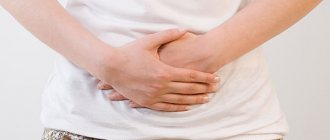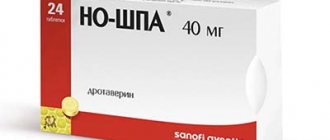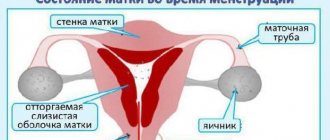09/13/2015 Menstruation Often, many girls experience bloating about a week before menstruation.
This is explained by the active production of the hormone progesterone during this period, which is responsible for the functionality of the smooth muscles of the uterus. The hormone relaxes this organ, makes it soft, and prepares it to receive an embryo in the event of conception. Doctors are quick to reassure: this is a normal phenomenon, and it is caused by some hormonal imbalances. They are the ones who provoke the appearance of edema, since the fluid is not removed from the body independently and in full. Therefore, the stomach also hardens and swells. After the end of menstruation, hormonal levels return to normal. However, PMS manifests itself differently in every woman, so not everyone gets an enlarged belly before menstruation. It depends on the:
- Body features;
- Physical training – muscle corset;
- Elasticity of the uterine muscles.
If the stomach is swollen in the absence of pregnancy and menstruation, this means the presence of some kind of gynecological pathology. Only a gynecologist can determine it after a diagnostic examination.
Bloating during menstruation
Menstruation is a natural process in the life of every woman.
This is another proof that the reproductive system is working and there is a possibility of conceiving a child. At the time of menstruation, the body gets rid of the old egg and prepares for the ovulatory period.
Menstruation sometimes causes a lot of inconvenience and unpleasant symptoms may appear. One of these is bloating during menstruation.
What should a woman do and should she fight this sign of menstruation? Abdominal enlargement is a natural physiological condition before or during menstruation.
This condition can cause a girl a lot of discomfort, especially if she is watching her figure and can be upset by a protruding tummy and extra pounds.
To understand why this occurs, you need to understand the reasons and look for a suitable way to avoid it.
Causes
Bloating during menstruation is normal and will go away on its own when it ends. The appearance of such a symptom during PMS can be influenced by external and internal factors.
- Body constitution.
- Weak muscles in the abdomen. When a woman tends to be overweight and her abdominal muscles are poorly developed, bloating will be clearly visible visually. Nothing will prevent this.
- Elasticity of muscle tissue in the uterus. Before menstruation, the uterus may increase in size, which will lead to the growth of the abdomen.
- Changes in hormonal levels. When the ovulatory period ends, the body begins to prepare for the implantation of a fertilized egg. It is possible that conception is not planned in principle, but it is so inherent in nature. At this moment, many hormones are released into the woman’s body, which affect the functioning of all internal systems. Sex hormones cause an enlarged uterus, which can affect intestinal function and increase the lipid layer.
- Excess fluid. PMS may be accompanied by bloating due to a large accumulation of fluid. This happens because the body stores water during menstruation. Symptoms: abdominal swelling and swelling of the limbs. This is the body’s natural reserve, which should not be feared. The water will go away along with the bleeding. But if it doesn’t exist, this is a serious problem.
- Ovulatory period. The presence of ovulation is very important for every woman. It occurs in the middle of the menstrual cycle. At this moment, the mature follicle ruptures, and the finished egg comes out to meet the sperm. At this moment, the body is simply oversaturated with a surge and excess of female hormones. At this moment, bloating and flatulence appear.
- Intestinal peristalsis. During PMS, there is a rush of blood to the pelvic organs, and since the intestines are closest, they get the most. At this moment, intestinal peristalsis becomes weak and the following occurs: bloating, flatulence, gas formation, disruption of the proper functioning of the intestines.
- Pathological diseases. In addition to natural and harmless factors, there may be more serious ones associated with any diseases.
Pathological problems with abdominal enlargement
Any woman should always closely monitor any changes and behavior of the body. For some, these may be ordinary symptoms of PMS, but if this has not been observed before, it is recommended to undergo an examination by a gynecologist.
- Inflammation of the genitourinary system.
- Disruption of the gastrointestinal tract.
- Tumors in the pelvic organs.
You especially need to be wary if, in addition to an enlarged abdomen, other accompanying symptoms appear: nausea, vomiting, fever, frequent urination, pain in the lower part of the peritoneum, intense discharge during menstruation.
His body “talks” to every person and reports problems. You just need to listen to him. An enlarged abdomen is one such sign.
If there are no periods or pregnancy, but the symptom does not go away, then this indicates a pathological process.
The main problem is that internal factors are not visible to the normal eye. One can only make assumptions.
A specialist can determine the exact reason why bloating occurs during menstruation. A woman notices only external changes. This is an enlarged belly and extra pounds.
What if I'm pregnant?
This reason is quite real. Sometimes, the onset of pregnancy can be confused with PMS. During this period, the female body produces the hormone progesterone.
It prepares the reproductive organs for bearing a child. With the onset of pregnancy, changes occur within the woman.
The egg enters the uterus and attaches to the wall (endometrium). This process is otherwise called implantation. Progesterone affects the endometrium.
It expands, absorbs nutrients and loosens. In turn, this causes the innermost lining of the uterus to swell and the abdomen begins to enlarge.
What to do
If there is no doubt that the symptom is associated with the onset of menstruation, then there are still some tips and solutions. First of all, you need to look at your diet.
If you eat right, you can solve many problems and bloating is one of them.
During this time, the body stores fluid to replenish blood loss. It is worth limiting your salt intake.
When a person eats salty foods, sodium accumulates in the body. This element prevents the removal of fluid.
It is also recommended to limit sweets. Sugar, like salt, causes sodium to accumulate inside and also increases glucose levels. Bloating can only be avoided if you reduce your intake of both.
To prevent the body from lacking fluid and accumulating it, you need to constantly drink fresh water. It is recommended to drink at least 2 liters.
This will help ensure constant fluid renewal, elimination of toxins and good digestion. Raw vegetables and fruits will also help replenish fluid in the body.
Don't drink coffee or black tea. These drinks contain caffeine, which causes bloating. Coffee increases acidity in the body, which means another problem may arise - gastritis or ulcers.
What should you not do during your period? Alcohol should be banned. Such drinks cause increased gas formation and nagging pain below.
Dairy products can also affect a woman’s condition during PMS.
For good digestion you need fiber. It is found in cabbage, greens, legumes, bran, berries and mushrooms. It is not recommended to introduce them into the diet abruptly.
You need to gradually increase the daily dose. The norm is 25 grams per day during menstruation.
Traditional medicine advises preparing special decoctions for this period. Infusions from:
Good health is possible if you follow simple recommendations that have been developed throughout your life.
If a woman wants to reduce the feeling of discomfort, then she needs to create a suitable daily routine with the right diet.
Walking in the fresh air helps cope well with unpleasant symptoms. Walking in the evening will be especially effective.
What to do if you have gas before your period?
If you have bloating, it is recommended to adjust your diet, since diet is the main cause of such problems. In addition, experts insist on reducing the amount of salt consumed. As you know, the accumulation of sodium in the body leads to the fact that this component delays the excretion of excess fluid, which may well provoke bloating.
Sweets in a woman’s diet are also subject to restrictions, because sugar consumption increases the level of glucose in the blood, which inevitably leads to a concentration of sodium.
When talking about how to eliminate or get rid of bloating before menstruation, gynecologists point out that:
- it is important to consume up to two liters of purified water per day, which will speed up the renewal process of fluid accumulated in the body and will also remove toxins;
- introducing fresh vegetables and fruits into the diet will have a positive effect on the digestive system, women’s health and the thyroid gland;
- coffee, black tea and other caffeinated drinks are recommended to be consumed in minimal quantities;
- In order to improve digestive function, foods containing fiber are introduced into the diet - this can be white cabbage, bran, as well as mushrooms and fresh berries.
In addition, replenishing the vitamin deficiency will help cope with the problem of bloating before menstruation. We are talking about certain vitamins and minerals, vitamins and minerals, for example, E, A, all components of category B. The list of essential microelements includes potassium, calcium, as well as magnesium and zinc. All of them alleviate the symptoms of premenstrual syndrome, normalizing the functioning of the female body.
Conclusion
Knowing your body comes with experience. At a young age, a woman is just learning to understand herself. Over time, it will become clear what is a natural expression of physiology. What to do about bloating?
If this problem causes discomfort, then you can find a solution and take some preventive measures.
Gas formation is often caused by improper bowel function, which is disrupted by the release of hormones. To avoid this, you need to monitor your diet and reduce the load on the gastrointestinal tract.
Causes of bloating during menstruation
The monthly menstrual cycle is a normal process in a woman’s life, which confirms that her reproductive function is fully functioning. But often this cycle is accompanied by discomfort, painful attacks that cause great inconvenience.
Menstruation repeats every month
Among the unpleasant symptoms is bloating during menstruation. This condition is mostly physiological and appears due to hormonal changes associated with the ovulation process. But in some situations, during the menstrual phase, a swollen belly can signal the presence of serious pathological diseases.
Intestinal problems
Many women complain of intestinal problems the day before or during menstruation. Intestinal upset is expressed in the form of frequent bowel movements, constipation or diarrhea. The presence of flatulence and cramps in the intestines can cause the stomach to become enlarged before menstruation. The reasons for these symptoms remain unknown. It is believed that changes in hormone levels may affect intestinal function. As a rule, the functioning of the digestive tract returns to normal as soon as menstruation ends. Progesterone has a relaxing effect on the intestinal muscles, impairing its functioning, which causes fermentation and increased gas formation. In this case, bloating during menstruation goes away after it ends.
An enlarged belly and mammary glands on the eve of menstruation may have the simplest explanation - pregnancy. If your menstrual flow is delayed, you should take a pregnancy test. When bloating is associated with pain, there may be a threat of miscarriage or ectopic pregnancy. In this case, you should immediately seek medical help.
What are the physiological causes of bloating?
Physiological causes of a bloated belly are noted as a natural feature of the body before menstrual flow. In a woman’s body during this phase, the amount of the hormone progesterone increases, which is important for conception. It provides the potential fetus with the necessary conditions in the mother’s uterus.
Progesterone relaxes the uterus, and the endometrium - the lining of the uterine cavity - thickens. This leads to slight bloating in the lower abdomen. If fertilization does not occur, progesterone decreases again and the phenomenon of a bloated abdomen goes away. This symptom goes away immediately after menstruation begins and, as is normal, does not require medical intervention.
In addition to hormonal changes, physiological causes of a bloated abdomen also include:
- Swelling – manifests itself as a protective behavior of the human body. It begins to accumulate fluid, stocking up on useful nutrients and essential microelements, hoping that during the menstrual period the body will lose a large supply of valuable fluid. Some experience swelling in the extremities, while others experience bloating.
Bloating can be caused by ovulation
- Ovulation - during this phase, the active production of female hormones occurs, and due to them, flatulence can occur.
- Pregnancy - at an early stage, bloating in the intestines can be confused with a harbinger of menstruation. However, it differs in that if conception was caused by bloating, then when examining the abdomen by palpation, it will be hard. If you have all the symptoms of pregnancy, you should do a hCG test. The causes of a bloated abdomen and nausea in women may be an ectopic pregnancy, which is not detected by the bi-test, then you need to consult a gynecologist and undergo an ultrasound.
Theories about the appearance of extra pounds during PMS
Scientists have been trying for a long time to determine the cause of PMS. But years of research have still not provided a clear picture of its appearance. The clinical characteristics of the syndrome include 100 symptoms, including bloating before the onset of menstruation, anxiety, hardening of the mammary glands, sweating, tremors, and numbness of the extremities. In severe manifestations, changes in blood pressure, disturbances in heart rhythm are observed, the temperature may rise, and suffocation may occur. The pathogenesis has not been sufficiently studied, which explains the considerable number of versions of the origin of premenstrual syndrome:
Hormones
One of the most common is the hormonal theory, which states that in PMS progesterone is inhibited by estrogen, causing swelling and psychological discomfort. In addition to an increase in estrogen levels, many of those examined experienced an increase in the amount of prolactin, which entails fluid retention. Thus, even a woman who has always weighed the same and had no fluctuations in the numbers on the scales notes that before the adjustments, the weight increased. When and on what day of the cycle to take a prolactin test, read the article at the link.
What pathological causes could there be?
Swelling of the abdominal walls should not cause significant discomfort. If a woman, in addition to bloating in the lower abdomen, experiences cutting pain, loud gurgling in the intestines and other negative symptoms, then this may indicate the progression of the pathological process.
The most common pathological causes include:
- Diseases of the genitourinary function. If during menstrual bleeding, in addition to bloating, pain, weakness, swelling are noted, and bags form under the eyes, this probably indicates the presence of nephritis.
- Disturbances in the functioning of the gastrointestinal tract. With a changing hormonal background, an exacerbation of diseases of the internal organs of the abdominal cavity begins. Due to the large influx of blood and the enlargement of the uterine cavity, gas formation is formed, which distends the abdominal cavity. Abnormal bowel movements, spasms, nausea may also occur, and the most distinctive feature is cutting pain in the navel area and slightly above.
The stomach often becomes bloated due to problems in the gastrointestinal tract.
- Pathological changes in gynecological organs. There are cramping pains that radiate to the lumbar area or the anus, and discharge may also change. Sometimes, in rare cases, it is accompanied by stool disturbances.
- One of the causes of bloating in the lower abdomen during PMS in women may be neoplasms that put pressure on the intestines and disrupt its function.
In addition to the above reasons, bloating can be observed after follicular puncture, which in rare cases is accompanied by bleeding.
What symptoms accompany bloating?
Bloating during menstruation can be complicated by certain disorders, such as:
- apathetic, aggressive, or changeable mood;
- loss of appetite or vice versa, the presence of constant hunger;
- an unpleasant feeling of bloating and heaviness in the lower abdomen, frequent nagging pain;
- unstable stool;
- decreased motor function;
- swelling and pain in the chest;
- the appearance of swelling of the limbs;
- increase in waist volume by several centimeters;
- severe headaches, which reduce performance;
- frequent dizziness;
- aching pain in the lower abdomen, spreading to the back, tailbone and hips;
- high body temperature, sudden rush of blood to the head and feeling of heat;
- skin irritations in the form of rashes on the body;
- increased sleepiness, constant desire to lie down;
- impairment of memory and concentration of general attention.
One of the accompanying symptoms may be dizziness
How to get rid of bloating with nutrition
When bloating occurs in the middle of the cycle, it is advisable to pay attention to the food consumed and adjust your diet. One of the most important dietary features is to reduce salt intake. When consuming salty foods, a large amount of sodium accumulates in the body, which in turn prevents the timely removal of excess fluid and leads to bloating.
It is necessary not only to reduce the amount of salt, but also to abandon dishes that contain a high content of this substance.
In addition, you should limit your consumption of sweets. The presence of high blood sugar increases the glucose level, and just like salt leads to sodium concentration. If you reduce your intake of salty foods, but do not reduce your consumption of sweets, the effect of a bloated belly will still occur.
It is recommended to drink more water. You need to drink up to three liters per day. Water helps speed up the regeneration process in the body. It also helps remove waste, toxins and improve the functioning of the digestive system. The necessary fluid can be replenished by including more fresh fruits and vegetables in your daily diet.
You can cope with bloating by dieting
Drinks containing caffeine, such as strong black tea and natural coffee, are best consumed to a minimum. Because caffeine causes bloating. It is also better not to drink drinks containing alcohol and gases. Alcohol stimulates the accumulation of gases in the body, and can periodically pull in the lower abdomen.
To improve the functioning of the digestive tract, it is necessary to include in the menu foods that contain fiber - these are: cabbage (but not white cabbage), berries, beans, mushrooms, grain bran and fresh herbs. The introduction is not abrupt, but gradual, the final daily portion is up to 25 grams per menstrual cycle.
In the diet, you need to increase the amount of foods that contain vitamins and minerals that are useful during the female menstrual cycle and weaken premenstrual symptoms, such as vitamins A, E and group B, calcium, zinc, potassium and magnesium.
Prevention of an unpleasant condition
If your stomach becomes larger during menstruation, flatulence and other unpleasant sensations appear, it is important to pay attention to the food that is regularly present in the diet. To prevent bloating you need to:
- Avoid excess salt. Minimize salting of dishes, exclude canned food, homemade preparations, salted fish, nuts and other snacks. Salt retains water and causes severe bloating.
- Reduce your consumption of sweets. Sugar, like salt, can cause bloating and provoke sodium deposition.
- Increase your water consumption. It is necessary to drink herbal teas and non-carbonated liquids. It removes harmful substances and improves metabolism. You can increase your fluid intake by increasing the amount of fruits and vegetables in your diet.
- Avoid caffeine. This substance provokes bloating and flatulence, so green tea and coffee should be consumed in limited quantities.
- Increase the amount of foods with vitamins A, E, B. Red berries, mint tea, fermented milk products, unrefined olive oil.
What other recommendations are there?
In order to feel good during menstrual bleeding, you need to resort to fractional nutrition, that is, eat in frequent small doses. With this process, it will be easier for the body to digest food and the level of glucose in the blood will decrease significantly.
Chamomile tea helps a lot
Traditional medicine recipes also help a lot. These remedies, in addition to getting rid of a bloated stomach, help prevent the manifestation of this symptom. It is useful during menstruation to drink decoctions and medicinal infusions from the herbs of chamomile, mint and lemon balm, lingonberries and cranberries, caraway seeds, dill and fennel. They have an excellent diuretic effect, helping to remove excess fluid.
You can use herbs in the absence of an allergic reaction and after visiting a doctor.
During the period of uterine bleeding, you can reduce a bloated abdomen with light exercise and massage. Sports exercises help speed up the elimination of gases. In addition, you can supplement them with walks, since the fresh evening air has a beneficial effect on your overall well-being.
In case of severe gas formation, you can resort to medications. You should have medications on hand that can localize the spasm, as well as drugs that speed up bowel function and help the rapid elimination of gases. But you need to remember that you should not self-medicate; it is better to entrust the selection of medications to a doctor who will prescribe medications based on the individuality of the woman’s body.
Bloating can be avoided if you follow the diet and all the recommendations a week before your period.
When to see a doctor
There is no need to ignore these symptoms and engage in self-diagnosis, because ordinary flatulence can be a harbinger of dangerous diseases that require treatment for bloating and abdominal pain during menstruation as soon as possible.
Why does my stomach swell before my period? If you want to find out, watch this video:
In some situations, medical assistance may be needed:
- during menstruation, the release of large blood clots;
- bleeding;
- severe pain when lying on your stomach;
- hard belly and increased flatulence;
- with any movement, a stiff, spastic pain appears;
- if the stomach is bloated and there have been no periods for more than a month;
- frequent nausea and even vomiting are observed;
- lack of appetite, lethargy and fatigue;
- high body temperature, chills;
- a bloated abdomen after the end of menstruation may indicate gastrointestinal disorders or the presence of tumors in the reproductive organs, such as fibroids.
Diagnostic tests are prescribed by a specialist to establish a diagnosis. The following laboratory tests and instrumental examinations are carried out:
- general blood analysis;
- general urine analysis;
- scatological research;
- endoscopy;
- ultrasound of female organs;
- abdominal ultrasound;
- laparoscopy and MRI (if indicated).
Endoscopy will help to find the cause of bloating.
Bloating syndrome during menstruation and PMS is a very common phenomenon that is caused by hormonal changes. But you need to listen to how you feel, since ordinary bloating can be a harbinger of a serious illness. You must follow all instructions and recommendations of a specialist.
The table shows remedies and products that reduce bloating during menstrual flow.
source
Results
The most common cause of bloating before your period is a problem with your intestines.
Intestinal diseases can cause gas formation, flatulence, rumbling, stool disturbances and other unpleasant symptoms. Proper nutrition, keeping the body hydrated, moderate exercise and massage can cope with this problem. However, if acute cutting pain occurs, you should immediately seek medical help.
Why does my stomach swell before my period? All healthy women of reproductive age undergo monthly periodic changes in the body that are aimed at possible conception. The menstrual cycle begins on the 1st day of menstruation and lasts on average 25-29 days. The entire cycle is divided into 3 phases: follicular (menstrual), ovular and luteal. It is subject to the complex interaction of hormones. In the luteal phase after ovulation, the process of preparation for a possible pregnancy begins. Under the influence of an increased amount of progesterone, the lining of the uterus thickens, filling with nutrients. If fertilization does not occur, then by the end of the previous cycle the level of the hormones progesterone and estrogen decreases. This causes the thickened upper layers of the uterus to begin to peel off and be rejected. The separation of the mucous layer of the uterus by the endometrium provokes bleeding, which is how menstruation begins.
By the beginning of menstruation, many women gain an average of 1 to 3 kg. Weight gain is explained by the fact that physiological fluctuations in progesterone and estrogen contribute to the accumulation of fluid; in women, the breasts swell, the abdomen enlarges, and the legs swell. In addition, hormonal fluctuations increase appetite in women, which consequently affects weight gain.
Why does the stomach bloat and swell before, during and after menstruation?
Only one out of every five women does not notice bloating before menstruation as an uncomfortable symptom of PMS. Needless to say, a blurry waist pretty much spoils the mood. Especially against the background of increased irritability associated with the same premenstrual syndrome. Some ladies hide the inflated “ball” under a corset or shapewear. But it’s better to figure it out and change your lifestyle so that in any phase of the cycle a swollen belly and swelling do not cause inconvenience.
What causes bloating
In general, bloating is associated with excessive production of intestinal gases due to poor digestion. The process is often caused by the abuse of fatty and heavy foods, which are less processed by the gastrointestinal tract. But women may have other reasons why their belly swells, especially if it happens a few days before their period. The symptom is caused by natural hormonal changes. In different phases of the cycle, the ratio of estrogen, progesterone and prolactin changes. Each of the substances plays its role in ensuring female reproductive function.
These same hormonal substances cause the body's cells to accumulate and store fluid before bleeding. This explains why edema appears and the stomach swells before and during menstruation. In parallel, the physiological process of preparation for conception takes place. The uterus enlarges, and so does the abdominal volume. Blood flows intensely to the pelvic area. All this goes away after the end of menstruation due to the reverse mechanism against the background of non-pregnancy.
Proper nutrition for weight control
The best assistant in maintaining your usual weight and good health will be a well-chosen diet.
Consume less salt and more water
As already mentioned, changes in hormonal levels before and during menstruation affect fluid retention, which entails an increase in body weight. Reduce your salt intake during this period and you will see swelling decrease. Follow the correct drinking regime and amount of water consumed.
Eat less sweets
Uncontrollable cravings for sweets indicate a decrease in estrogen. The desire to eat a huge cake at the same time as chocolate visits many women at such moments. The lower your estrogen, the faster your desire to eat sweets may increase. Complex carbohydrates will come to the rescue. A sufficient amount of them in the diet brings long-term satiety. Contained in cereals, legumes, wholemeal bread, whole grain pasta.
Create a varied menu
Weight gain before menstruation will be more controllable if the body does not experience a deficiency of important microelements such as magnesium and calcium. Their lack leads to an increase in appetite, and the mood can change every minute. If your diet is not rich in these microelements, you can make up for the deficiency with pharmaceutical drugs, having previously agreed on the feasibility and schedule of administration with your doctor. Magnesium and calcium in the required amount relieve chest pain and bloating, and the craving for sweets decreases several times. There are often cases when the PMS problem goes away completely.
How many days before your period does your belly get bigger?
It is impossible to say for sure how many days bloating occurs before menstruation. Each body is individual; for some girls, the problem of bloating and swelling appears in another 1.5-2 weeks.
However, in most cases, the change is noticeable 3 days before the discharge. During this period, you can see a slight increase in body weight.
Those who pay attention to:
- sports, abdominal training;
- strengthening the pelvic floor muscles, which weaken with age and after childbirth;
- proper nutrition and prevention of excess weight.
Yes, obese women and women who have given birth experience an increase in the abdomen, but this reaction of the body is considered natural and normally disappears on the 2-3rd day of menstruation or after it.
Intestinal problems
Intestinal diseases can also cause bloating and distension in the abdomen. For such diseases, it is worth adjusting your diet by eliminating certain foods and giving up bad habits. Abundant nutrition should also be reconsidered, replacing it with fractional, gentle ones. Eating foods that retain water in the body and thereby cause swelling is unacceptable.
If you feel normal, you can play sports. Walking during menstrual periods is very useful.
7 days before the onset of menstruation, in order to avoid bloating and flatulence, it is recommended to take an infusion of dill seed or fennel, and take enterosorbent medications 2 times a day.
During menstruation, in the absence of severe cutting pain, you can do abdominal massage or breathing exercises. This will stimulate abdominal blood circulation and normal digestion. Self-massage of the peritoneum is done in this way:
Causes of bloating before menstruation
To combat the unpleasant symptoms of PMS, it is necessary to accurately determine the mechanism of their occurrence. Could bloating before menstruation be associated with pathologies? Yes, and you should definitely double-check this option. But there are other factors as well.
Hormonal reasons
A large belly on the eve of menstruation is associated with an increased concentration of progesterone; it is this hormone that is responsible for preparing the genital organs for conception. After ovulation, in the so-called luteal phase, the endometrium (the lining inside the uterus) grows. It serves to nourish the embryo with all the necessary substances. The uterus swells and puts pressure on neighboring organs. When the body realizes that conception has not occurred, the endometrium exfoliates and comes out with blood during menstruation. The size of the abdomen returns to normal.
Intestinal peristalsis
The heavier uterus puts pressure on the intestines. Progesterone itself has an additional effect. It reduces the tone of the lower esophageal sphincter, gastric emptying takes longer, and food moves more slowly. Under the influence of the hormone, unpleasant intestinal symptoms before menstruation become more pronounced, pain in the abdomen, rumbling, lack of appetite, constipation or diarrhea may appear.
Pregnancy
When pregnancy cannot be ruled out and there is a delay, that is, the period has passed, but they are still missing, the first thing you should do is take a test. Two stripes appear on a special indicator after contact with urine if a specific hormone is detected - human chorionic gonadotropin (hCG).
But it is worth remembering that the result may be distorted due to pathological processes, for example, in the case of an ectopic pregnancy. To be completely sure, it is better to contact an antenatal clinic. An effective diagnostic method is pelvic ultrasound.
Pathological processes
Gynecological diseases - fibrosis, endometriosis, tumors of the uterus and ovaries - can be hidden behind a growing belly. In such cases, in addition to bloating before menstruation and swelling, the following are often present:
- failures in the regularity of the cycle;
- frequent urge to urinate;
- constant feeling of indigestion.
If your stomach is swollen and hurts, your body temperature is elevated, your bloody discharge is profuse or of an unusual color, additional symptoms appear and your health worsens, you should consult a gynecologist.
It happens that ailments similar to PMS are present, but menstruation does not begin. A check with a doctor will help rule out inflammatory processes and neoplasms in the genital organs.
Binge eating
Due to hormonal changes, many women feel hungry towards the end of their cycle. They are constantly drawn to eat, and the situation is aggravated by stress. But trying to cheer yourself up with nourishing and tasty food is not an option. As mentioned above, before menstruation and the associated flatulence, food moves through the gastrointestinal tract more slowly, for this reason, heaviness in the stomach often appears after bloating, which is very inappropriate on the eve of menstruation. It is advisable to ensure that the dishes are simple and do not burden the body.
Premenstrual syndrome
Why does the stomach swell before menstruation, and how many days does it take to go away? On the eve of the next menstruation, many women develop premenstrual syndrome. The condition is characterized by irritability, fatigue, nausea, swelling, and headache. In addition, there is soreness in the mammary glands, a bloated stomach, an increase in body temperature, and an increased heart rate. The list of PMS symptoms is varied and can occur in both mild and severe forms.
Premenstrual syndrome affects most women living in megacities and in unfavorable environmental conditions. The reasons remain not fully understood. Today, there are several versions of the occurrence of PMS:
- the condition is caused by a difference in sex hormones that occurs in different phases of the menstrual cycle;
- the theory of the neurogenic origin of the syndrome is based on metabolic disorders of transmitters in the central nervous system;
- The hyperprolactinemic cause of the syndrome occurs due to increased pituitary hormone, which can cause reproductive, metabolic and emotional disturbances in women.
Symptoms of premenstrual syndrome can be divided into physical and psychological manifestations. Bloating is a physical symptom. As a rule, if the abdomen enlarges before menstruation, there is also pain in its lower zone. In addition, by the beginning of menstruation, the cervix acquires a hard structure and the surface becomes dry. Insufficient hydration adds discomfort and causes unpleasant sensations. Before menstruation, the uterus enlarges slightly and descends. At the same time, the cervix should open as much as possible for the unhindered removal of menstrual blood.
Bloating before menstruation can occur due to swelling. Physiology is designed to accumulate fluid for upcoming blood loss. To replenish the blood, water is needed, which accumulates and creates swelling. As a result of the accumulation of fluid in the extracellular tissue spaces, general edema develops, an enlarged abdomen, swelling of the fingers and toes, and swelling of the face are observed.
Bloating during and immediately after menstruation
There is such severe flatulence during and after menstruation that the intestines do not return to normal and the stomach does not shrink. If necessary, use drugs that promote the removal of gases (Activated carbon, Meteospasmil, Espumisan). You can try folk remedies against bloating before menstruation - chamomile decoction, dill water.
It is important not to miss any pathology. You should consult a doctor if your stomach is still swollen after your period ends. Going to the hospital should not be delayed if you have the following symptoms:
- increased body temperature;
- unusual discharge;
- stomach ache.
Pregnancy can also be the cause of an enlarged waist after menstruation. This situation is likely if the discharge was more scarce than in previous cycles. You should check with a gynecologist if the bleeding has stopped, but the nagging pain in the abdomen and lower back continues.
Bloating before and during ovulation
Discomfort in the abdomen can appear not only during menstruation, but also on days 10-14 of the cycle - before and during ovulation. This is not associated with pathology. The process of follicle rupture occurs in all women who are able to conceive and give birth to a child. But not every one of them feels the symptoms of ovulation. Tingling in the back, nagging pain in the lower abdomen - women who have given birth feel especially acutely in the middle of the cycle.
To make sure that the malaise is associated specifically with ovulation, you can buy a special test at the pharmacy. It is noteworthy that in this situation it is easier to get an answer than to guess why the stomach swells before and during menstruation.
Gas formation as a sign of pregnancy
The cause of increased gas formation and bloating on the eve of menstruation may be pregnancy. The risk of flatulence is especially high if there is a predisposition and chronic diseases, such as irritable bowel syndrome.
Other digestive disorders may be present - nausea, lack of appetite, changes in taste, bitterness in the mouth. You should be wary and consult a gynecologist if your periods have not started within the prescribed period, and the following symptoms are observed:
- breasts are swollen;
- increased irritability;
- swelling of the arms and legs appeared;
- the stomach has increased in volume.
How to relieve bloating
A pre-adjusted diet is extremely important. Food portions should not be excessive. Even before your period, it is recommended to exclude foods that provoke increased gas formation in the stomach - cabbage, legumes, fresh bread, nuts, mushrooms, raw vegetables and fruits in excess. When digestion worsens, you can briefly add enzymes (Mezim, Festal).
But what to do if the abdominal cavity is still inflated during menstruation, severe discomfort and a feeling of fullness appear? Carminative medications (Espumizan, Kolikid, Pepfiz) are used as a therapeutic measure. They destroy gas bubbles, and they are absorbed by the intestinal walls.
If rumbling in the stomach accompanies all the time, and not just during menstruation, the reason may be a violation of the microflora. A course of probiotics (Linex, Hilak) will be useful.
It is recommended to take any medications only on the recommendation of a doctor. At the same time, it is worth trying to get rid of the problem in other ways.
Avoid salty foods
Excess salt causes the scale to show increased body weight.
It just so happens that 1 sodium molecule binds 20 water molecules. The more it enters the body, the greater the swelling and the higher the volume of retained fluid in the abdomen.
To prevent the belly from growing and bloating before and during menstruation, in the second half of the cycle you need to limit the consumption of salty foods (canned meat, sausages, marinades, smoked meats, fast food, sauces and seasonings). The reason is not only the risk of edema, but also the associated stress on the blood vessels and heart.
Eat potassium-rich foods
Why is potassium needed? It removes salt and, accordingly, prevents the appearance of edema. Foods that contain potassium include:
In addition to potassium, magnesium and B vitamins are needed. It is advisable to start taking a special vitamin complex 1-2 weeks before your period so that the body accumulates strength to fight stress and nervous tension.
Try diuretics
In some cases, diuretics - diuretic medications - are used a few days before menstruation. They help reduce edema, that is, the accumulation of fluid in the cells. But independent and uncontrolled use of such drugs is fraught with an imbalance of potassium and sodium, and excessive loss of salts.
There are natural remedies with a mild diuretic effect that will not cause such harm: zucchini, parsley, green tea, carrot and beet juice.
Drink plenty of water
It is important that a sufficient amount of fluid enters the body. Coffee, strong tea and soda are not suitable as they increase flatulence.
The preferred drink is water, especially a couple of days before and after your period starts. With its regular use, harmful substances are eliminated faster, digestion is normalized, constipation goes away, and the general condition of the body improves.
If tolerated, you can take chamomile decoction, cranberry and lingonberry fruit drinks. They relax the abdominal muscles and have a mild diuretic effect.
Avoid refined carbohydrates
Sweet foods also cause salt retention and increase the risk of developing edema on the eve of menstruation. This is because refined carbohydrates bind water. Not as strong as sodium, but still. 1 g of carbohydrates can retain up to 4 g of water.
Simple sugars are poorly satiating and contribute to the rotting of food masses. Therefore, if you are prone to flatulence, the menu is limited to:
- confectionery;
- bakery products;
- sweet sodas;
- store-bought juices;
- products containing sugar and white flour.
Be active
Physical activity is required in everyday life. Walking long distances is very beneficial. It has a positive effect on the gastrointestinal tract and improves the process of removing gases.
In the absence of contraindications, it is recommended to do abdominal exercises 2-3 times a week. Such training not only strengthens the abdominal muscles, but also the torso, and enriches the organs with oxygen and blood.
You can choose another sport - swimming, exercise equipment, dancing, aerobics, running. Avoid heavy exercise only during menstrual days and when you feel unwell. But after the end of menstruation they return to an active lifestyle.
Nutrition
A feeling of bloating or distension in the abdomen may be associated with the appearance of gases in the intestines. When eating foods that contribute to the appearance of edema and flatulence, the stomach swells, rumbling appears, and a feeling of fullness in the abdominal area appears. A few days before the onset of menstruation, it is worth excluding from the diet:
Even more interesting:
Sores around the head
Mouth ulcers hiv
- legumes;
- sugar;
- sweet dishes;
- milk;
- black bread;
- fresh white cabbage;
- celery;
- peanut;
- smoked;
- hot and spicy dishes;
- salty:
- fried meat, fish;
- carbonated drinks;
- strong coffee.
It is necessary to exclude overeating and consumption of harmful foods. The diet should include 4-5 meals. Alcohol promotes gas formation, so it should also be avoided.











